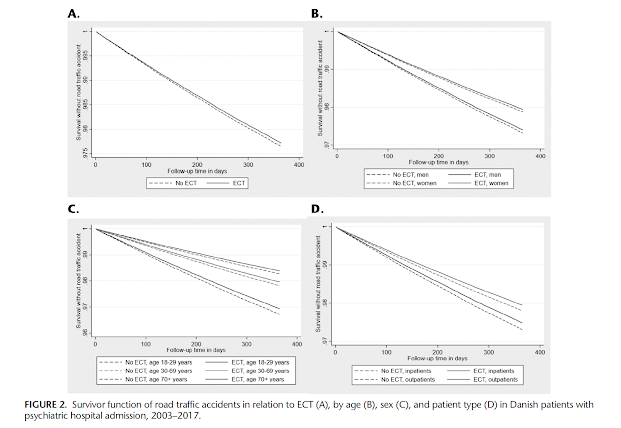ECT Does Not Increase Risk of MVA: New Register Study From Denmark
Out on PubMed, from investigators in Denmark, is this study:
Electroconvulsive Therapy and Risk of Road Traffic Accidents: A Danish Register-Based Cohort Study.
J ECT. 2022 Sep 6. doi: 10.1097/YCT.0000000000000881. Online ahead of print.PMID: 36095094

The abstract is copied below:
Objective: The aim of the study is to examine whether electroconvulsive therapy (ECT) was associated with the subsequent risk of being involved in a road traffic accident.
Methods: A cohort of all 375,435 patients older than 18 years with their first psychiatric hospital contact between 2003 and 2017 in the Danish National Patient Registry was followed for road traffic accidents until December 2018. Associations between ECT and road traffic accidents were examined using Cox regression analyses with multiple adjustments and using propensity score matching on sociodemographic and clinical variables.
Results: A total of 8486 patients (0.2%) were treated with ECT. During the median follow-up of 5.9 years, 778 of these patients (12.5%) were involved in a road traffic accident and the unadjusted incidence of road traffic accidents was lower among these patients (incidence rate, 15.5 per 1000 patient-years; 95% confidence interval [CI], 14.5-16.7) compared with patients not treated with ECT (incidence rate, 20.0 per 1000 patient-years; 95% CI, 20.0-20.3). Electroconvulsive therapy was not associated with road traffic accidents in the Cox regression models after adjustment for all covariables (hazard ratio, 1.00; 95% CI, 0.92-1.08) or in the propensity score-matched sample (hazard ratio, 0.91; 95% CI, 0.83-1.08). The HRs did not vary materially with follow-up time or when analyses were stratified on sex, age, or type of hospital contact.
Conclusions: The analysis of Danish National registry data indicates that ECT is not associated with the risk of being involved in major road traffic accidents.
The article is here.
And from the text:


Kudos to our Danish colleagues for this ingenious use of public data!





Comments
Post a Comment